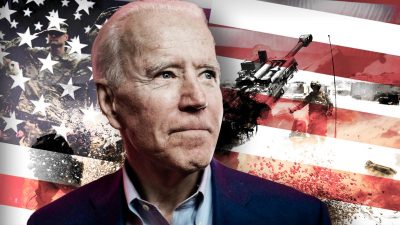Faith Leaders Call on Biden to End Economic Sanctions

Leaders of 18 American faith and faith-based humanitarian organizations appealed to President Joe Biden this week to eliminate general U.S. economic sanctions against nations that are dealing with the ravages caused by the COVID-19 pandemic, as well as with the disruptions caused by the sanctions themselves.
In a letter delivered to the White House and congressional offices Wednesday, leaders representing Quaker, Mennonite, Catholic, Presbyterian, Methodist, Unitarian, and Lutheran congregations and groups, said that these unilateral sanctions were in many cases exacerbating humanitarian crises that are affecting the most vulnerable populations, including women and children, the most.
“Several of our organizations work to support the most vulnerable people in some of the most heavily sanctioned regions in the world, including Iran, Syria, and North Korea, and we witness first-hand the harmful impacts of U.S. economic sanctions,” the leaders warned.
“Although we are told that sanctions are intended to influence the policies of governments, they often have harmful effects far beyond their intended targets, claiming the lives of innocent men, women, and especially children,” they said.
The letter, signed by Jim Winkler, the president and general secretary of the National Council of the Churches of Christ in the USA, and Susan Henry-Crowe, the General Secretary of the United Methodist General Board of Church and Society, among others, comes at a time of growing controversy about the utility of U.S. sanctions as a foreign policy tool to persuade or force hostile or abusive governments to change their policies and how to mitigate the humanitarian costs that their imposition has caused.
While the United States has long used sanctions against states Washington considered hostile — its famous trade embargo against Cuba was imposed in 1960 — their application proliferated beginning in the 1990s and reached a torrid pace under former President Donald Trump whose administration imposed an average of almost 1,000 sanctions against various foreign entities over his four-year term.
Many such sanctions are selective or targeted against specific individuals or companies accused of trading with previously sanctioned countries, committing human rights abuses, supporting terrorism, or participating in certain programs, such as arms development or sales. Comprehensive or general sanctions — as against Iran and Syria — have been designed to make it as difficult as possible, if not impossible, for targeted countries to participate in international trade or access international financial networks.
While the impact of all sanctions necessarily ripples through target economies, comprehensive sanctions have been aimed at forcing governments to surrender to Washington’s will or face a popular or elite uprising resulting in “regime change.” Either way, the impact of such sanctions has normally exacted a huge toll on the welfare of target populations, often causing dire shortages of basic necessities, such as food and medicine, as well as sharp increases in unemployment and inflation.
Although successive administrations have issued waivers and exemptions for U.S. and foreign companies and charities supplying humanitarian goods, as well as banks that help finance such transactions, the administrative processes for obtaining them have generally been slow, complicated, and cumbersome. Even when exemptions have been forthcoming, many suppliers and banks have proved reluctant to follow through due to concerns that they may transgress other sanction laws or regulations.
“Even when technical exemptions for food and medicine are in place, they don’t work, because the fear of secondary sanctions have a chilling effect on humanitarian transactions by governments, financial institutions, and relief organizations,” the faith leaders observed in their letter.
The controversy over the humanitarian consequences of sanctions has intensified since the outbreak of the COVID-19 pandemic when the delivery of vaccines and other medical supplies needed to contain the virus in several hard-hit countries, particularly Iran and Syria, has been hindered or substantially delayed by the application — or the fear among relevant providers or shippers that they could run afoul — of those same sanctions.
One study by the Brookings Institution found that the lives of 13,000 Iranians who fell victim to the virus could have been saved in just the four months between last May and September had their country not been subject to U.S. sanctions.
Hopes had been high that a U.S. Treasury study ordered by Biden early in his term would result in a major reconsideration of the use of sanctions and their humanitarian impact. But reform advocates were deeply disappointed when Treasury’s nine-page report simply recapitulated what was already widely known. And while his administration has delisted several unilateral sanctions imposed by Trump by executive order, it has yet to show any inclination to conduct a major review.
In their letter, the faith leaders called on the administration to “show moral leadership by ending the use of broad economic sanctions that too often result in the deaths of innocents and fail to change government behavior.” It can do that, they said, by ensuring that manufacturers will never face sanctions for providing vaccines and other COVID-related materials to sanctioned countries, encouraging the same manufacturers to share patents for vaccines and increase vaccine production, and lifting barriers that prevent multilateral institutions — including the International Monetary Fund and the World Bank — from providing emergency loans to fight COVID.
They also called on the administration to expedite exemptions and licensing for humanitarian trade and suppliers to treat and prevent COVID’s spread, as well as other health infrastructure in sanctioned countries in consultation with civil society and aid groups to ensure they are not subject to sanctions.
Invoking Pope Francis’s call on governments to “stop aggression, blockades and unilateral sanctions against any country anywhere on earth,” as well as the appeal to governments and pharmaceutical companies by 150 of their colleagues earlier this year to vaccinate the world against COVID-19, the 18 groups insisted that “the majority of those harmed by economic sanctions are not political leaders, but ordinary people and particularly the most exploited and the most vulnerable — the poor, the displaced, racial and ethnic minorities, widows and orphans.”

